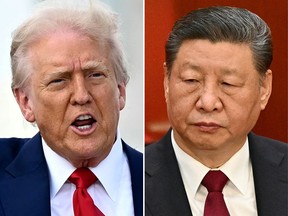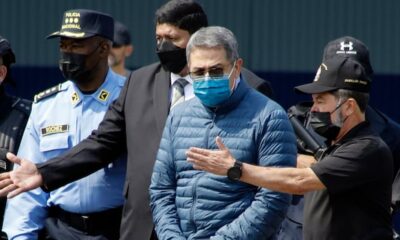Politics
Trump Cancels Xi Meeting, Threatens Major Tariffs on China

U.S. President Donald Trump announced on Friday that he no longer intends to meet with Chinese leader Xi Jinping during the upcoming Asia-Pacific Economic Cooperation (APEC) summit in South Korea. This decision follows Trump’s condemnation of China’s trade practices, particularly its recent export controls on rare earth minerals, which are vital for modern technology. In a lengthy post on Truth Social, Trump labeled China as “very hostile” and indicated he is considering imposing “massive” tariffs on Chinese imports.
Trump’s comments reflect growing tensions between Washington and Beijing. He stated, “Some very strange things are happening in China! They are becoming very hostile,” while on his way to a medical appointment at a military hospital near Washington. The President expressed his discontent over China’s imposition of export controls, which he claimed were communicated to various countries globally.
In his post, Trump elaborated, “I was to meet President Xi in two weeks… but now there seems to be no reason to do so.” He highlighted his dissatisfaction with China’s recent trade moves and insisted, “One of the policies that we are calculating at this moment is a massive increase of tariffs on Chinese products coming into the United States of America.”
As Trump’s tariff threats surfaced, financial markets reacted swiftly. Wall Street stocks fell sharply, as investors grew concerned that the renewed trade dispute could escalate into a full-blown trade war. This development marks a significant shift from Trump’s earlier intentions to engage positively with China. Just last week, he emphasized the importance of the planned meeting with Xi, which was set to be their first discussion since he regained the presidency in January.
In his post, Trump accused China of attempting to monopolize key materials essential for technological advancement, including “magnets and other elements.” He described this strategy as “a rather sinister and hostile move.” The President also voiced skepticism about the timing of China’s announcements, suggesting they were intended to overshadow his recent diplomatic success in brokering a ceasefire agreement between Israel and Hamas.
Rare earth elements play a crucial role in various industries, ranging from smartphones and electric vehicles to military applications and renewable energy technology. Currently, China dominates the global market for these materials, making its trade policies particularly impactful.
Trump asserted that other nations have expressed concern regarding China’s trade practices, which he characterized as a sudden and unwarranted escalation of hostility. He stated, “There is no way that China should be allowed to hold the world ‘captive’,” reflecting his administration’s hardline stance on trade relations.
This latest round of threats comes on the heels of a previous tit-for-tat tariff exchange earlier this year, which had threatened to curtail trade between the world’s two largest economies. Although both sides had previously agreed to de-escalate tensions, the current climate remains fragile.
Furthermore, Trump indicated he would prioritize U.S. soybean purchases in discussions with Xi, as American farmers continue to deal with the repercussions of ongoing trade conflicts. In a reciprocal move, China announced it would impose “special port fees” on U.S.-operated and built ships, following Washington’s introduction of similar charges for Chinese-linked vessels earlier this year.
The situation continues to evolve, with significant implications for global trade and economic stability. As both nations navigate these complex issues, the international community watches closely, aware that decisions made in Washington and Beijing will reverberate worldwide.
-

 Politics4 weeks ago
Politics4 weeks agoSecwepemc First Nation Seeks Aboriginal Title Over Kamloops Area
-

 World5 months ago
World5 months agoScientists Unearth Ancient Antarctic Ice to Unlock Climate Secrets
-

 Entertainment5 months ago
Entertainment5 months agoTrump and McCormick to Announce $70 Billion Energy Investments
-

 Science5 months ago
Science5 months agoFour Astronauts Return to Earth After International Space Station Mission
-

 Lifestyle5 months ago
Lifestyle5 months agoTransLink Launches Food Truck Program to Boost Revenue in Vancouver
-

 Technology3 months ago
Technology3 months agoApple Notes Enhances Functionality with Markdown Support in macOS 26
-

 Lifestyle3 months ago
Lifestyle3 months agoManitoba’s Burger Champion Shines Again Amid Dining Innovations
-

 Top Stories2 months ago
Top Stories2 months agoUrgent Update: Fatal Crash on Highway 99 Claims Life of Pitt Meadows Man
-

 Politics4 months ago
Politics4 months agoUkrainian Tennis Star Elina Svitolina Faces Death Threats Online
-

 Sports5 months ago
Sports5 months agoSearch Underway for Missing Hunter Amid Hokkaido Bear Emergency
-

 Politics5 months ago
Politics5 months agoCarney Engages First Nations Leaders at Development Law Summit
-

 Technology5 months ago
Technology5 months agoFrosthaven Launches Early Access on July 31, 2025





















